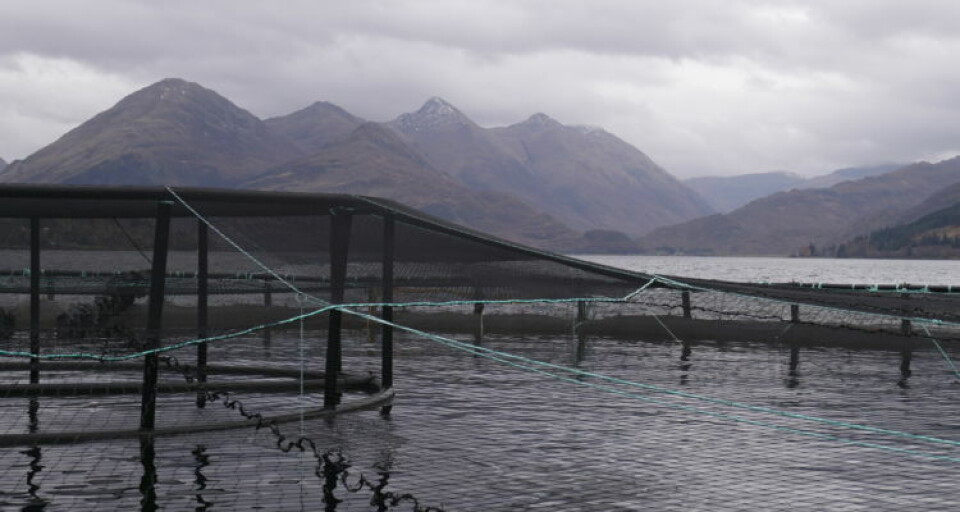
First-quarter volumes halved for MH Scotland
Marine Harvest Scotland’s harvest volumes dropped significantly in the first three months of this year compared to the same period in 2017, Marine Harvest Group’s 2018 first quarter report has revealed.
MH Scotland harvested 8,691 tonnes gutted weight, less than half the 17,772 tonnes harvested in the corresponding quarter in 2017. The company said this was due to lower opening biomass, as a consequence of biological challenges and lower production, and timing of smolt stockings.
Operational EBIT for MH Scotland amounted to €16.1 million in the first quarter (€55.4m Q1 2017), the equivalent of €1.85 per kg (€3.12). The effects of higher achieved prices and increased margin from the Consumer Products division on salmon of Scottish origin were more than offset by lower harvest volume and cost increases. Financial EBIT amounted to €14.7m (€18.0m).
Although reduced from the fourth quarter of 2017, the cost level per kg harvested increased in Q1 2018 compared to Q1 2017, due to mortality, negative scale effects from lower volumes and harvesting from lower performing sites than in the comparable quarter.
Biological costs per kg increased by 43% in Q1 2018 compared to Q1 2017, mainly due to increased health costs, mortality and negative scale effects. Incident-based mortality of €1 million (€0.7m) was recognised due to anaemia and fish damaged in a storm.
Sea lice levels at the end of the quarter were higher than at the end of the comparable quarter of 2017.
Low temperatures and storms
Production in the first quarter has been adversely impacted by low seawater temperatures and storms.
“The biological performance has been challenging for our Scottish operations during the last quarters on low volumes and lower performing sites,” stated the report. “This situation is not expected to improve significantly in the next quarter. Accordingly, costs are expected to remain high also in the second quarter of 2018.”
There was better news from Ireland, where operational EBIT amounted to €6.4m in the first quarter (€0.9m), which was a seasonal record high. At €4.37, operational EBIT per kg was all-time high (€1.48 per kg). Financial EBIT amounted to €11.3 million (€13.4 million).
Marine Harvest said the strong earnings in the quarter are explained by improved market conditions for organic salmon, reduced costs and one-offs related to sales of eggs.
The biological costs per kg harvested biomass decreased by 11% compared to the first quarter in 2017.
Accelerated harvest
Harvest volume was 1,457 tonnes gutted weight in the first quarter (633 tonnes Q1 2017). The increase is due to volume carried over from the fourth quarter in order to gain more growth. Costs are expected to increase in the second quarter of 2018.
In Marine Harvest’s primary production area, Norway, supply increased by 6% compared to the first quarter of 2017 which was less than expected. A cold winter in Norway with lower than expected sea water temperatures has resulted in less growth.
Volumes from Chile increased by 30% compared to the first quarter of 2017. The increase was more than expected and mainly driven by an algal bloom which caused many farmers to accelerate harvest.
In Canada, volumes increased by 2% which was less than guidance. Biological performance during the autumn of 2017 was challenging, which has impacted growth and reduced volumes suitable for harvest.
In the Faroe Islands volumes increased by 6%, in line with guidance.
‘Good result’
Overall Marine Harvest Group achieved an operational EBIT of €158m in Q1 2018, and will give a quarterly dividend of NOK 2.60 per share.
“The demand for salmon has increased globally this year, compared to the end of 2017. This has led to high prices and a good result for Marine Harvest in the first quarter,” said chief executive Alf-Helge Aarskog.
Marine Harvest reported operational revenues of €862m (€892m) in the first quarter of 2018. Total harvest volume was 81,212 tonnes in the quarter (83,768 tonnes). Estimated harvest volume for the full year of 2018 have been reduced from 410,000 tonnes to 400,000 tonnes due to less growth in sea.






















































